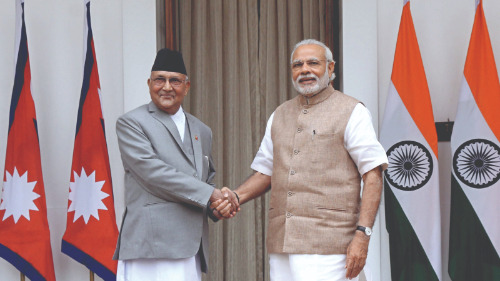Mending bridges
Despite setbacks and tensions in recent years, strong Indo-Nepal ties must continue

Nepal has been an independent nation and it is India's extended family. No amount of doubt can change that. It has been like that since times immemorial. Nearly seven million Nepal citizens live in India and about 6,00,000 Indian citizens are domiciled in Nepal. They have been visiting and working in both countries for indeterminate years. It is a civilisational bond and placing this relationship to a time span of a few hundred years will be myopic. The British used Nepal as a frontline and a buffer state but independent states of India and Nepal changed all that when they signed the 'Treaty of Peace and Friendship' in 1950 and which provided free movement to nationals of both countries beyond each other's geographical borders along with many other mutual benefits. And, contrary to a very negative perception in certain quarters, neither this treaty was an act of charity by the Indian State nor was Nepal being a subservient state in accepting this accord.
Most distressingly, however, there are voices in Nepal calling it an encroachment of its sovereignty and an unwelcome extension of Indian influence. The immediate provocation is the territorial issue surrounding a patch of land close to the Lipulekh Pass on the India-China border which is one of the approved points for border trade and the route for the Kailash-Mansarovar yatra in Tibet. Fortunately, since then, the acerbic nature of this debate has been recognised by both governments and Indian Foreign Secretary Harsh Vardhan Shringla arrived in Kathmandu on November 26 on a two-day visit to set into motion future steps to assuage Nepalese anxieties including the ones caused by the visit of Chief of India's External Intelligence earlier in October. Although the latter visit was with the acquiescence of Nepal's Intelligence Establishment, it still raised heckles within the ruling party itself with ex-Prime Minister Pushpa Kamal Dahal 'Prachanda' leading the tirade. But seemingly, that did not stop Prime Minister Oli from asking the Chinese envoy to refrain from interfering in domestic affairs of Nepal and strengthening (nefarious) linkages with the ruling Nepal Communist Party.
These may be mere domestic convolutions within the ruling party in Nepal but what is material to note is that Prachanda had headed the Maoist insurgency that ended Nepal's monarchy and led to the establishment of a democratic republic. During the insurgency era in Nepal, a strong Nepalese Maoist-Indian Naxalite nexus had emerged in the region as a serious threat to the internal security of India as a whole and in particular to five states — UP, Bihar, Uttaranchal, West Bengal and Sikkim along the 1,751 km border. A regular exchange of men and material between the Maoists in Nepal and Naxalite outfits in India was observed and Prachanda had come under the very close watch of Indian intelligence agencies actively supported by security systems of both countries. He apparently is carrying that baggage. More so after the culmination of the insurgency and him coming to power as the Prime Minister he was unable to convince Nepal's Army Chief to induct about 20,000 ex-Maoist radicals into the Nepal Army. Worse, he could not sack the Army Chief for not doing his bidding. Prachanda then had to step down as the Prime Minister.
Evidently, deep institutional linkages between Nepal and India which restored wisdom to a somewhat inexperienced ruling establishment from taking hasty steps survived.
The test of this relationship came again with the objection by Nepal's Defence Minister to the visit of India's Army Chief General Naravane, which was set aside and most notably the Minister himself was relieved of the defence portfolio with Prime Minister Oli taking charge himself. General Naravane, in accordance with a well-established tradition, was conferred with the honorary rank of General of the Nepalese Army. In January last year, in a similar gesture, Nepal Army Chief General Purna Chandra Thapa was also made the honorary General of the Indian Army by President Ram Nath Kovind at a ceremony in New Delhi.
It is estimated that about 50 thousand Nepal nationals serve in 39 battalions of seven Gorkha regiments of the Gorkha Brigade in the Indian Army and paramilitary organisations. Six of these regiments were transferred from the erstwhile British Army while one was formed after independence. This relationship goes back to the year 1815 when the Gorkhas from Nepal commenced being part of the British troops in India. In the annals of military history, these regiments acquitted themselves with exemplary military achievement. In World War Two, the Gorkhas received 10 out of 26 Victoria Crosses awarded to Indian Army. In post-independence India, the highest award for gallantry, the Param Vir Chakra has been conferred on three Gorkha personnel. And all seven Gorkha regiments received battle honours for the 1971 war.
Approximately 30 Gorkha Gentlemen Cadets graduate as officers from military academies every year. They are trained at India's NDA, Defence Services Staff College and the College of Combat. In the highest seat of learning for strategic and security issues preparing Indian armed forces and civilian personnel for statecraft at highest positions, the National Defence College in New Delhi also assembles global alumni from nearly 25 foreign countries which always includes senior army officers from Nepal. Their representation is likely to increase.
There are several mechanisms functioning for overseeing the projects on anvil between India and Nepal and we may be faced with varying degrees of dissatisfaction and disappointments which may add to our level of distrust. During these difficult situations, only a sensitive perception and acknowledgement of each other's impediments can help. And if there is a call for reviewing the treaty then we should embark on this task with sagacity as demonstrated in the past.
The writer is a strategic affairs commentator. Views expressed are personal



